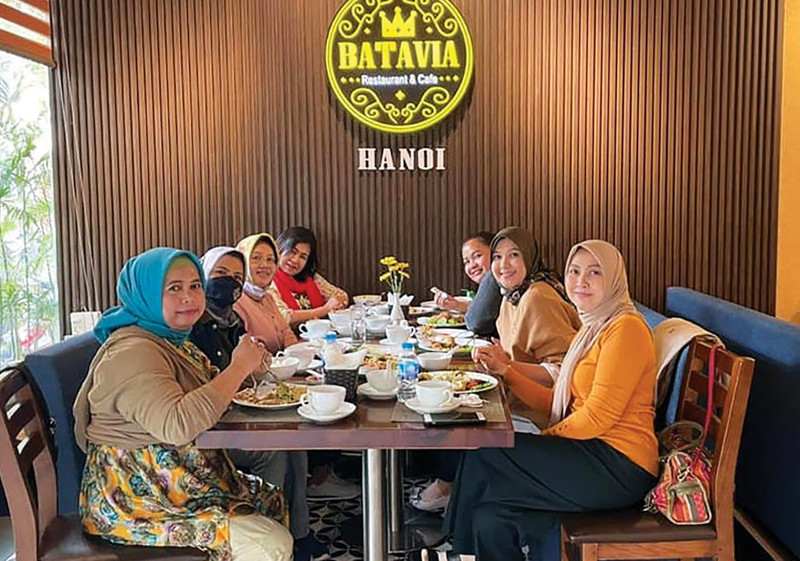With an estimated global value of over 200 billion USD per year, Halal tourism - or Muslim-friendly travel - is becoming an increasingly popular trend being actively pursued by many countries around the world, including Vietnam.

Muslim tourists enjoying cuisine at Batavia Halal Indonesian Restaurant, 116 Ngoc Ha Street, Ba Dinh, Ha Noi. Photo: Topcom
As the nation’s political, cultural, and tourism hub, Ha Noi is considered well-positioned to lead the development of a standardised Halal tourism ecosystem. At present, the capital’s tourism sector is investing strategically to tap into this “gold mine” by attracting Muslim visitors.
A friendly destination for Halal travellers
Halal tourism refers to travel services designed in accordance with Islamic principles and requirements. This includes strict adherence to Islamic standards across food and beverage services, accommodation, transportation, entertainment, and shopping. Halal tourists mainly come from countries such as Indonesia, Malaysia, Brunei, India, and the Middle East.
Nguyen Quy Phuong, Director of the Department of International Cooperation and Tourism Promotion under the Viet Nam National Authority of Tourism, stated that the global Halal tourism market is forecast to exceed 200 billion USD by 2025 and surpass 350 billion USD by 2030, making it one of the fastest-growing segments in the industry.
“The global Muslim population is rising rapidly, now exceeding 2 billion people. By 2034, it is projected that 67% of this population will be under the age of 40. This young demographic has a high demand for travel and strong spending power-an enormous potential for the global tourism market. With its geographical proximity to key markets in Southeast Asia and the Middle East, Viet Nam is well-placed to seize this opportunity, and Ha Noi in particular has numerous advantages for developing Halal tourism,” Phuong explained.
According to the Ha Noi Department of Tourism, the city currently has a Muslim community of nearly 2,000 people. Over recent years, Ha Noi has welcomed a growing number of visitors from countries with large Muslim populations, including India, Malaysia, Indonesia, Bangladesh, Turkey, Saudi Arabia, the United Arab Emirates (UAE), Egypt, Brunei, and Qatar. In 2024 alone, these markets accounted for around 650,000 arrivals, representing approximately 15% of Ha Noi’s total international visitors.
Tran Trung Hieu, Deputy Director of the Ha Noi Department of Tourism, noted that the city already has considerable infrastructure to serve the Halal tourism segment. Certified Halal accommodations include Melia Hanoi and InterContinental Hanoi Landmark72, while several other four- and five-star hotels offer Halal-certified dining services, such as Hotel Du Parc, Grand Mercure, Pullman, Mövenpick Living West Hanoi, JW Marriott, Sofitel Legend Metropole, Grand K Suites, and Fraser Suites. Ha Noi also has a mosque and a number of restaurants catering specifically to the Muslim community.
A boost for the capital’s tourism sector
Despite its advantages and strong potential, experts have pointed out that Halal tourism development in Ha Noi still faces limitations - most notably, a lack of Halal-standard service providers. Many businesses remain uncertain about the criteria required to effectively serve Muslim travellers.
Sharing further insights on Halal certification standards, Ramlan Osman, Director of the National Halal Certification Centre (HALCERT), said that airports, hotels, and restaurants should provide designated prayer areas and separate dining or café spaces for Halal guests. Recreational and entertainment areas should clearly separate facilities for men and women.
On this issue, Mieu Abbas, President of the Halal Certification Organisation in Viet Nam, stated that his organisation has certified a number of businesses in the food, cosmetics, and service sectors across the country, including in Ha Noi. However, he candidly acknowledged that many enterprises still face difficulties due to a lack of basic knowledge, insufficient guidance on standardisation, a shortage of specialised consultants, and the absence of effective market connection channels with international Muslim tourists.
To fully tap into the Halal tourism “gold mine” and provide fresh impetus for Ha Noi’s tourism industry, Nguyen Manh Than, Chairman of the Ha Noi Tourism Association, suggested that the city should initially pilot Halal-standard services at eligible establishments and increase promotional efforts to brand Ha Noi as a Muslim-friendly destination.
Nguyen Quy Phuong added that Ha Noi needs to build a comprehensive Halal tourism ecosystem, ranging from certified food supply chains and suitable accommodation systems to specially designed tourism offerings such as agricultural experiences, sustainable green tourism, and digital tourism.
According to the Ha Noi Department of Tourism’s development plan to 2030, the city aims to build a comprehensive Halal tourism ecosystem, prioritising the establishment of “Halal Friendly Zones” in central districts. Dang Huong Giang, Director of the department, stated that in the near future, it will work with airports and accommodation providers to designate areas for welcoming Halal travellers. In addition, it will coordinate with embassies and international organisations to organise Islamic cultural exchange events and promote training for personnel serving Muslim guests.
“The Ha Noi Department of Tourism will also advise and propose that the city introduce optimal support policies for businesses serving Halal visitors,” she affirmed.
Hoang Binh Phuong/hanoimoi.vn
Translated by NDO